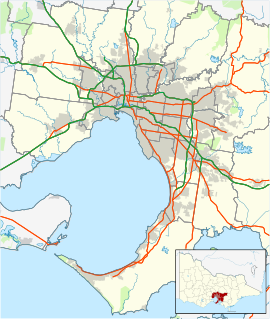Burke Road
Burke Road | |
|---|---|
 | |
| Burke Road looking north from Cookson Street in Camberwell. | |
| Coordinates | |
| General information | |
| Type | Road |
| Length | 12.3 km (7.6 mi)[1] |
| Gazetted | May 1983[2] |
| Route number(s) |
|
| Major junctions | |
| North end | Maltravers Road Ivanhoe East, Melbourne |
| |
| South end | Sir John Monash Drive Caulfield East, Melbourne |
| Location(s) | |
| Major suburbs | Kew East, Balwyn North, Camberwell, Glen Iris, Malvern East |
Burke Road is a major north–south thoroughfare in Melbourne, Australia. It runs from Ivanhoe East to Caulfield East and through the major shopping district at Camberwell.
It is aligned with the western boundary of Elgar's Special Survey,[3] and does not conform to the 1 mile (1.6 km) interval cadastral survey grid for Melbourne.
Route
[edit]Burke Road starts at the intersection with Lower Heidelberg and Maltravers Roads, heading south as a dual-lane, single-carriageway road through Ivanhoe East until crossing over the Yarra River, where it widens to a four-lane, dual-carriageway road, crosses the Eastern Freeway, and continues south until it reaches the intersection with High Street, Kilby and Doncaster Roads, where it narrows to a four-lane single-carriageway road. It continues south through Balwyn, over the Lilydale railway line and through Camberwell Junction at Camberwell, crossing the Monash Freeway and Glen Waverley railway line at Glen Iris, eventually to terminate at Princes Highway in Caulfield East, just outside Monash University's Caulfield campus.
Tram route 72 runs along the road between Whitehorse Road in Deepdene, and Malvern Road in Glen Iris.
History
[edit]Burke Road was originally known as Boundary, West Boundary or New Cross Road.[4]
The passing of the Country Roads Act of 1958[5] (itself an evolution from the original Highways and Vehicles Act of 1924[6]) provided for the declaration of State Highways and Main Roads, roads partially financed by the State government through the Country Roads Board (later VicRoads). A northern extension to the existing declaration of Burke Road, from Main Heidelberg-Eltham Road (Lower Heidelberg Road) at Ivanhoe East to Gardiners Creek at Glen Iris, was declared a Main Road on 9 May 1983.[2]
Burke Road was signed as Metropolitan Route 17 between Ivanhoe East and Caulfield East in 1965. Metropolitan Route 17 continues south, with a brief concurrency along Princes Highway, via Grange Road eventually to Moorabbin.
The passing of the Road Management Act 2004[7] granted the responsibility of overall management and development of Victoria's major arterial roads to VicRoads: in 2004, VicRoads re-declared the road as Burke Road (Arterial #5874), beginning at Main Heidelberg–Eltham Road (Lower Heidelberg Road) at Ivanhoe East and ending at Princes Highway in Caulfield East.[8]
Major intersections
[edit]| LGA | Location[1][8] | km[1] | mi | Destinations | Notes |
|---|---|---|---|---|---|
| Banyule | Ivanhoe East | 0.0 | 0.0 | Maltravers Road (north) – Eaglemont | Northern terminus of road and Metro Route 17 |
| Roundabout | |||||
| Boroondara | Kew East–Balwyn North boundary | 1.6 | 0.99 | Half Diamond interchange, westbound entrance and eastbound exit only | |
| 2.7 | 1.7 | Kilby Road (west) – Kew East | |||
| Kew–Deepdene boundary | 4.6 | 2.9 | |||
| 5.3 | 3.3 | Mont Albert Road – Mont Albert | |||
| Hawthorn East | 5.4 | 3.4 | Concurrency with Metro Route 32 | ||
| Camberwell | 5.8 | 3.6 | Rathmines Road (west) – Hawthorn | ||
| 7.0 | 4.3 | Camberwell Junction No right turns permitted at intersection | |||
| 8.6 | 5.3 | ||||
| Stonnington | Glen Iris | 9.3 | 5.8 | Diamond interchange | |
| 9.6 | 6.0 | Malvern Road – Prahran, Malvern East | |||
| Malvern East | 10.1 | 6.3 | |||
| 10.9 | 6.8 | Wattletree Road – Armadale, Malvern East | |||
| 12.0 | 7.5 | Waverley Road – Malvern East | |||
| Glen Eira | Caulfield East | 12.3 | 7.6 | Metro Route 17 continues briefly east along Dandenong Road to Grange Road | |
| Sir John Monash Drive (south) – Caulfield, Monash University | Southern terminus of road | ||||
1.000 mi = 1.609 km; 1.000 km = 0.621 mi
| |||||
See also
[edit]Notes and references
[edit]- ^ a b c "Burke Road" (Map). Google Maps. Retrieved 1 November 2021.
- ^ a b "Victorian Government Gazette". State Library of Victoria. 30 June 1983. p. 1976. Retrieved 30 December 2021.
- ^ Lay, Maxwell (2003), Melbourne Miles: The Story of Melbourne's Roads, Melbourne: Australian Scholarly Publishing, ISBN 1-74097-019-5
- ^ National Trust of Australia - Victoria. ""Burke Road and Camberwell Junction - Historic Area"". National Trust. Archived from the original on 24 February 2012. Retrieved 1 November 2021.
- ^ http://classic.austlii.edu.au/au/legis/vic/hist_act/cra1958182.pdf State of Victoria, An Act to consolidate the Law relating to Country Roads 30 September 1958
- ^ State of Victoria, An Act to make further provision with respect to Highways and Country Roads Motor Cars and Traction Engines and for other purposes 30 December 1924
- ^ State Government of Victoria. "Road Management Act 2004" (PDF). Government of Victoria. Archived (PDF) from the original on 18 October 2021. Retrieved 19 October 2021.
- ^ a b VicRoads. "VicRoads – Register of Public Roads (Part A) 2015" (PDF). Government of Victoria. p. 832. Archived from the original on 1 May 2020. Retrieved 19 October 2021.

